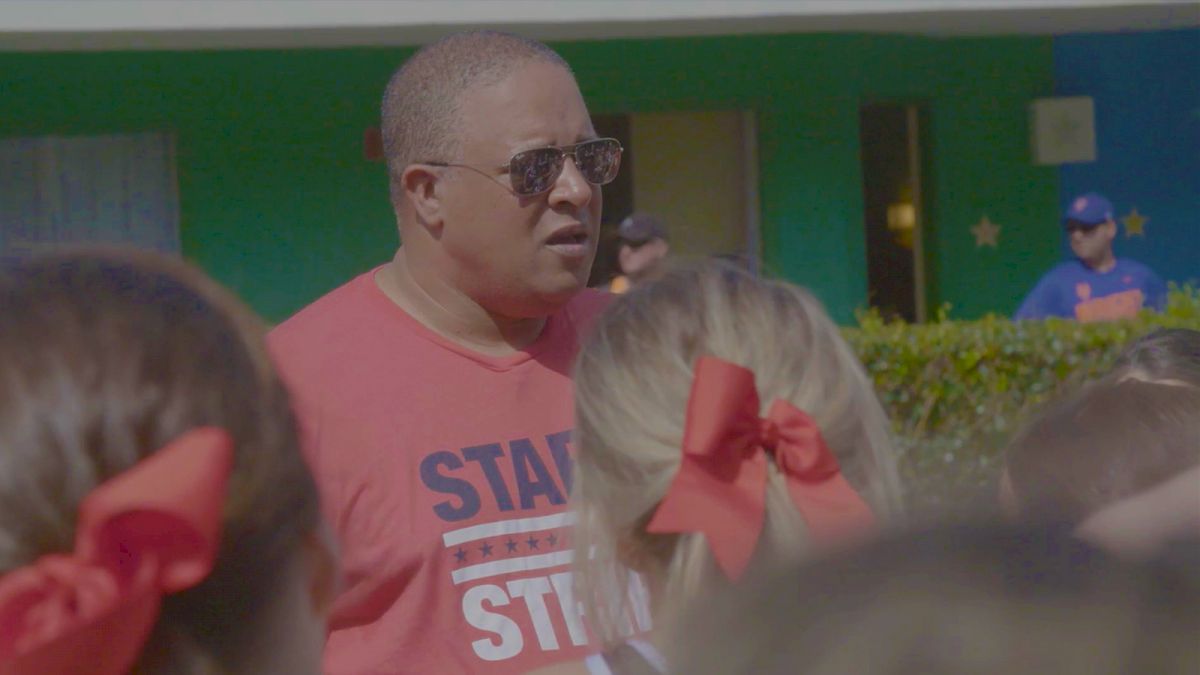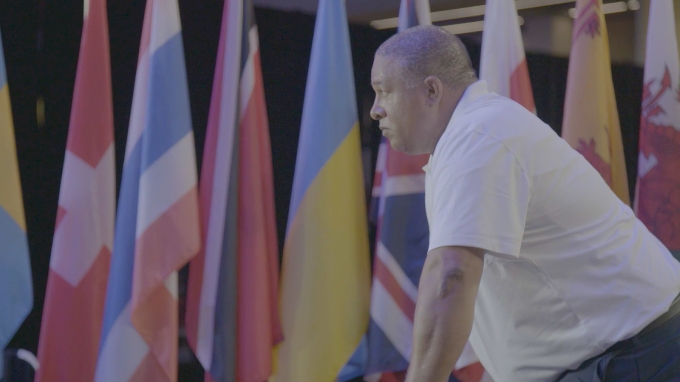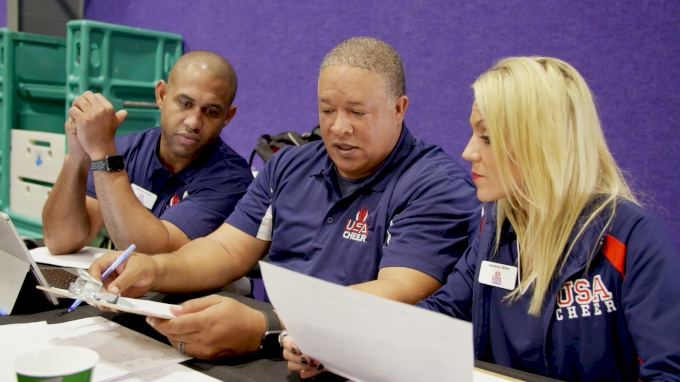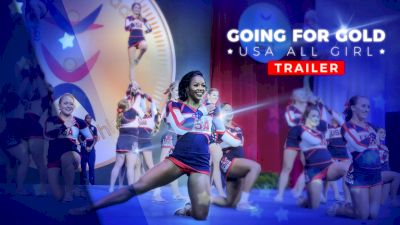7 Coaching Secrets From U.S. National Team Head Coach, Tony Nash
7 Coaching Secrets From U.S. National Team Head Coach, Tony Nash
We caught up with the U.S. National All Girl Team's head coach, Tony Nash to see if we could get inside one of cheerleading's most brilliant minds.

From Indiana All Girl to the U.S. National Team, Tony Nash is the man behind some of cheerleading's best teams and most memorable performances. An unconventional start has led to a lifetime of passion and a career of coaching success.
We caught up with the U.S. National All Girl Team's head coach, for a little Q&A to see if we could get inside one of cheerleading's most brilliant minds.
Meet Tony Nash
How did you begin your cheerleading career?
I began my cheerleading career after playing college football. I accepted a scholarship as a senior in high school to play in college and then was injured during the season. I decided to sit out a year and then try to come back but had another season-ending injury.
I decided it was time to stop playing football and started looking for other activities I could participate in. I transferred to another junior college close to home and my roommate was on their cheerleading team. He talked me into coming out for the team, and that’s where it all started.
What's your coaching history?
I started coaching at Barton County Community College in Great Bend, KS. I was at Barton for 3 years. A position became available at my alma mater; Wichita State University. I accepted a position there and coached them for 2 years.
At that point, Myron Doan from Morehead State University in Kentucky reached out to me to see if I would be interested in coaching at Morehead State and working with him. I immediately went to visit MSU and accepted the job. I coached the All Girl and Coed teams for 8 years.
After leaving Morehead State, I planned on going back to Kansas to use my degree in criminal justice and enter the law enforcement field. The process wasn’t moving fast enough and I had an offer to coach at Indiana University with the All Girl team.
In addition to coaching in college, I was approached by Bill Seely and Karl Olson to pilot a program in 2009 for the U.S. National Team. The first year was myself coaching USA All Girl, Jomo Thompson (University of Kentucky) coaching USA Coed, and James Speed (University of Louisville) floating between the two teams. The first year was a success and that’s where I started with the U.S. National Team. I took over as the Director for U.S. National Teams in 2013 and have been with them since.
When did you know you wanted to coach?
I’ve always enjoyed coaching. Before coaching cheerleading, I coached gymnastics for a few years. I also coached little league baseball and football in the community.
7 "Secrets" To Coaching Success
You've had a long, successful coaching career—what motivates you?
I feel my motivation to coach is more about “coaching” life. I want to be able to teach my athletes tools that they can use in the future. I apply my principles and philosophy in coaching to teach life lessons on success, failure, adversity, and relationships, etc.
I think it is important to be able to demonstrate through coaching so they can learn these tools to apply in their athletic career, their family, their future career, and their overall culture moving forward.
What, if anything, is different about coaching the U.S. National Team?
Coaching the U.S. National Team is extremely difficult. Most believe it is easy because we are comprised of some of the most talented athletes in the country. The thing that people don’t understand is that we have talent, but it takes time to develop a trust and a bond to form chemistry. In addition, we are training a group of individuals on elite level skills to become a team. With only 8-9 days of training, that is extremely difficult.
Most teams have months and even the year to train and prepare. The U.S. National Teams meet for training and 9 days later compete for a World Championship! I could only imagine what we would be capable of if we had a season to prepare!

Speaking of talent, what is it like to have the opportunity to create a team of the greatest athletes in the nation?
This is a challenge as well. With having a lot of talent from across the nation, this presents its own challenges. With the athletes coming from all types of coaching styles and techniques, we have to spend a large portion of time re-training them to do things the same. When your athletes have been successful with the way they’ve done things in the past, it’s hard to break habits and create new habits with our coaching staff. When you have a team of talented athletes, it doesn’t make skills easier because now you are trying even more difficult skills.
What did you look for most in an athlete when picking the team?
We want athletes that want to be coached. We want individuals that are able to put aside their ego and re-learn a new style they may not be accustomed too. Obviously, we want the group to have a high skill level and be talented in more than 1-2 areas, we need for them to be versatile.

What can an athlete really do to stand out at the selection process?
Group selection is key for the All Girl U.S. National Team. If you have a weak link in your group, for instance, someone who doesn’t tumble, it can affect the entire group. With having such a short opportunity to train, we need for all members to be well rounded in all skill areas. If you have a great top girl and 1-2 good bases with an average backspot, more than likely that will affect your entire group.
We are looking for well-rounded groups, not just individuals. With that being said, if we have a stand out individual, there is a chance that we may take an extra athlete or two. That’s just a disadvantage since they will not have an entire group to train with.
What would you say is your coaching philosophy?
My coaching philosophy really focuses on a process. I’m very meticulous with how I like to get to certain points of training, there is always a thought process that is going through my mind. I like to be prepared and a couple steps ahead of what I’m actually training the athlete. I want them to not fully understand the “why” of training and focus in on the “how”. Once we have completed our training, they will understand both the “how” and “why” to the end result.
I would also say that I am big on life lessons. I try to coach in a way that years later they may reflect back on something that is done or said and immediately know how to imply the effort or lesson they have learned through training. I don’t want it to be just an athletic lesson, I want them to be able to apply in any circumstance of life.
What are some of your favorite memories as an athlete or as a coach?
I can’t really single out a favorite, but some memories that stand out would be any time we are able to sing the National Anthem on the podium. I also have great memories of being able to implement the junior teams, the special abilities teams, the para teams, and the dance teams. I have really enjoyed being able to grow our program and expose more athletes to the U.S. National Teams and represent our great Country!
If I had to narrow it down, some great moments have been having United States veterans come and speak and visit with the teams. We have also had a former US Gold Medal Olympian, Mel Pender come in and speak to the teams. It’s awesome for the teams to hear from veterans who have to protect our country and have sacrificed so much so we can enjoy the life we have today. Being able to hear Mel Pender speak to the teams and talk about his history with being a veteran and a multiple time Olympian, it was just so influential.
Watch Going For Gold: USA All Girl (Season 3)
In this 3-part Varsity TV documentary, follow USA All Girl through tryouts, training and on their journey to the 2018 ICU World Cheerleading Championships.

The U.S. National Team is home to America's top female athletes in the prime of their cheerleading career.
The team, coached by Tony Nash and Savanna Sibley, has gone undefeated in the Premier All Girl division for the past nine years at the ICU World Cheerleading Championship but with cheer growing so rapidly around the world, the competition is getting tough.